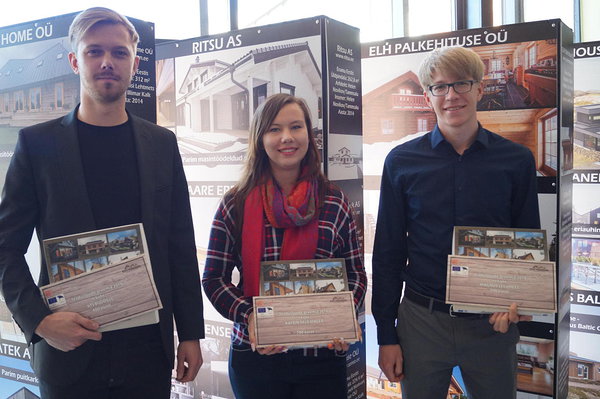The best scientific research was this year written in Tallinn University of Technology
For the second time Estonian Wooden Houses Cluster in co-operation with Estonian Wooden Houses Association issued awards for scientific research work of pre-fabricated wooden houses. The awards were presented by Tea Varrak, Vice-Rector for Innovation and Business Relations at Tallinn University of Technology, on October 18.
From left: Ats Buddell, Katrin Nele Mäger, Magnus Lelumees
Photo by: Tiit Tamberg/Puitmajaklaster
The best research was this time written by Katrin Nele Mäger from Tallinn University of Technology. Her thesis concentrated on implementation of new materials to the component additive method for fire design of timber structures.
“I believe that my work will increase knowledge of engineering of timber structures’ fire design and trust towards wood as a safe building material,” said Mäger.
„I am very positively surprised and I am really happy for the award and acknowledgement,“ added Mäger.
According to the jury the winning work was very thorough, it includes high level tests, analysis and provides an important input into development of fire resistance of timber structures. Katrin Nele Mäger’ s fire design formula for gypsum boards is an important input that considerably helps to increase the speed of engineering of element and modular houses in future.
II prize winner Ats Buddell’ s (Estonian Academy of Arts) work offers a constructive solution specific to wood, with emphasis on creating a building system that is based on architecturally clean and elegant wood with its natural structure. The work provides a thorough overview of using wood in urban space and to characterize the idea he offers a plan of a timber frame building to fill a gap in Tallinn city center that has various limitations. According to the jury the work has been written in a simple, catching manner emphasizing the benefits of wood as a material and building from wood.
III prize went to Tallinn University of Technology MSc Magnus Lelumees and his thesis about a renovation solution of a student hostel using modular wooden elements. The jury notes that the work is thorough, with fine analysis and actual because it is the first time a similar renovation solution has been used in Estonia. The research is important because it covers reconstruction and insulation of reinforced concrete apartment buildings – most of Estonia’ s old apartments that are soon going to be outdated – with modular wooden elements.
The goal of Estonian Wooden Houses Cluster of awarding scientific research work is to motivate students to consider research topics relevant to the wooden houses sector, development of co-operation between the cluster and universities and guiding of science and development activities concerning production of pre-fabricated houses.
Estonian Wooden Houses Cluster:
Estonian Wooden Houses Cluster currently has 41 members, 36 of whom are companies engaged in production of timber houses. The consortium also includes professional associations, educational and science institutions and supporting organizations contributing to the sector’ s development. The umbrella-company and initiator of Estonian Wooden Houses Cluster is Estonian Wooden Houses Association.
Estonian wooden houses sector’ s sales revenue was approximately 318 million euros in 2015 and based on absolute numbers Estonia is Europe’ s number one wooden houses exporter.


